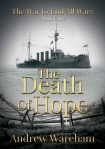The Death of Hope by Andrew Wareham (classic books for 7th graders TXT) 📗

- Author: Andrew Wareham
Book online «The Death of Hope by Andrew Wareham (classic books for 7th graders TXT) 📗». Author Andrew Wareham
There was three feet of water in themessdecks, waves travelling end to end with the pitch. The men below sat up onbunks and tables above the water, as much as they could be. There was nowhereelse for them to go on the small ship. Inevitably, some swallowed splashes ofsalt water, others became seasick. A very few hours saw a flotsam of vomit ontop of the flood. A few more hours and they discovered that the heads wereunavailable – they could hardly reach them and were unable to flush them overthe side. More solids accrued in the water.
The compartment stank.
Fourteen hours and Lancelot reached calmerseas, closer inshore, was able to increase speed. Six hours more and she foughther way to a buoy at Harwich, using the wireless to announce her presence. Theseas were too rough to put off a boat and she waited in isolation for anotherfull day.
“Clean ship, Number One.”
Strachan, who had spent the storm in thewardroom with Waller, unable to reach the bridge, saluted and acknowledged theorder. The three from the bridge sat down wearily, took a hot drink, sought abunk.
Lightning, Lynx and Lucifer steamed inover the day, all more or less storm damaged. All three had lost their mast andthe radio aerial attached.
Simon surfaced after six hours of sleep –he was still tired but was incapable of sleeping more than a few hours at astretch, watchkeeping habits totally ingrained.
He found the coxswain on deck, supervisingthe clean up and watching hands painting on the forward deck.
“Down to bare metal at the bows, sir. Likesandpaper, the waves were.”
“Have you cleaned out the forecastle?”
Simon had not been to the messdecks, knewwhat he would see there.
“Scuttles open, sir. Hosed out the lot.Never get the bunks and hammocks dry, sir. Lost some blankets overboard, sir.Put in a requisition to Stores, sir.”
Stores would refuse the order on thegrounds that Lancelot had had a full issue less than two years previously. Toget anything, he would have to go to Tyrwhitt.
“Commodore’s barge, sir.”
The coxswain organised the reception andsent word to the wardroom. All officers were on deck, fully dressed, beforeTyrwhitt came alongside.
“Carry on, Sturton. Must be busy. Badstorm!”
“Severe gale, sir, and found us closerthan I liked to the Dutch coast. Managed to claw off without entering theirwaters.”
“That’s the important thing, Sturton! Howdoes it come about that you alone retained your mast?”
Simon pointed.
“Extra preventer stays, sir. Mr Mainwaringshipped them in readiness for the winter storms.”
“Well done, that man!”
“I haven’t had a full set of reports yet,sir. Lucifer lost one man, a gunlayer who was swept overboard trying to securethe ready use to their new three inch. The gun itself seems to have takendamage, or the bandstand it’s set upon has. Bloody stupid thing to set aboard adestroyer, sir. Impossible to aim off a rolling, pitching platform and howoften is a destroyer stable?”
“Good question, Sturton. Three ships tothe yard. Lynx and Lightning can go in to mine; Lucifer must return to Chatham.How do you stand?”
“Lost blankets overboard, sir, and anumber of hammocks used to protect the forward four inch, sir. Most of themwill never be usable again.”
“Put in your requisitions, I will speak toStores.”
It was clear from Tyrwhitt’s tone that hedid not believe Simon. He would support his own man, however.
“Five days, Sturton. I need you back outon station. What’s your opinion?”
“Light cruisers, sir. The new ships are asfast, almost, as a destroyer and better seaboats. Bigger targets for a torpedo,I will accept. Far better suited to North Sea waters in winter.”
“I agree. Haven’t got them, can’t do it.”
“Trawlers, perhaps, sir? A flotilla of sixto support each other. Designed for rough weather. Slow. Should be able tocatch a submarine.”
“They would be ripped to pieces by the bignew German destroyers. Those things are damned near the size of a lightcruiser!”
“Accepted, sir. Small ships can’t work outof the harbour at Dunkerque, sir. Whatever you decide to use, they will have tobe based on Harwich. I must imagine the Dover Patrol had difficulties theselast few days.”
“Shocking bad harbour to work from with agale up-Channel. Word is that they were scattered over half of the southernNorth Sea. Harwich has its advantages!”
One of those advantages was that Ipswichwas less than an hour distant. Simon was able to achieve a day away from theship.
Chapter Ten
Thebattle of Loos petered out, drifting into desultory exchanges of machine gunfire and brief artillery hates, killing a few men occasionally, achievingnothing.
The war was far hotter to the rear wherethe generals and the staff and London sought to pass the blame to each other.
General French blamed all of his juniorsin turn – they had misunderstood his orders, probably intentionally, had placedthe reserves far behind the point he had demanded, had failed to unleash thecavalry, had permitted too short a bombardment. The lieutenant generals incommand of the corps that had failed to break through blamed French for launchingan ill-prepared, poorly planned battle; simultaneously, they berated the majorgenerals in charge of their divisions for failing to push forward hard enough.The major generals unanimously claimed that the fault lay with the staff who hadnot planned the battle properly; they then blamed their brigadiers for notfighting the battle correctly on the ground. The brigadiers had no doubt thestaff had let them down but gave their colonels a rocket for not making theadvances laid down for





Comments (0)